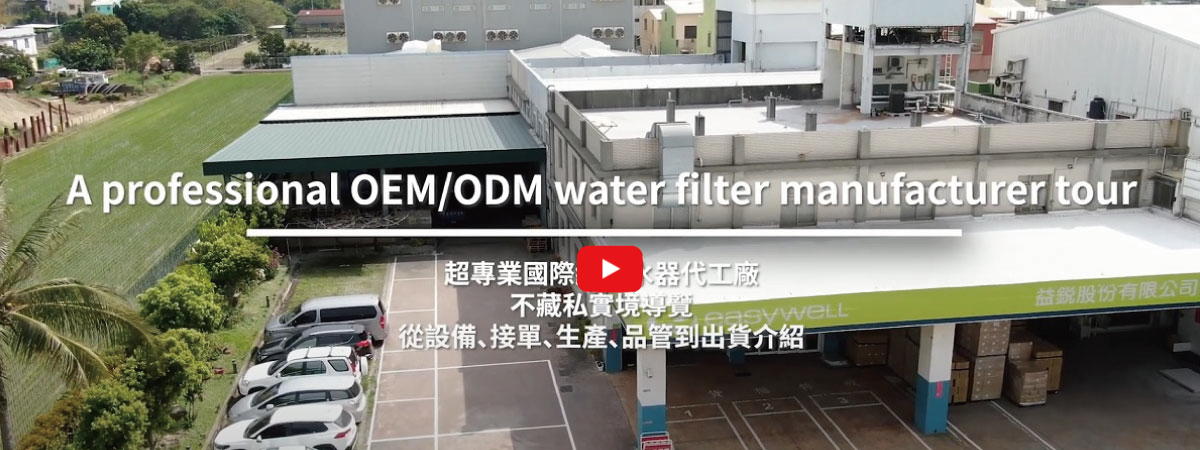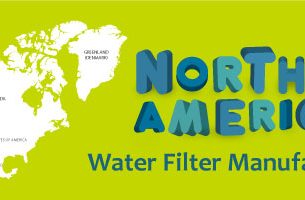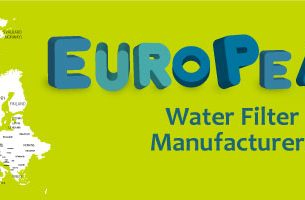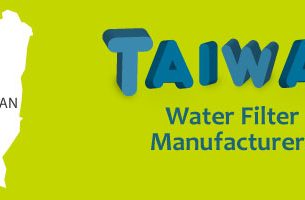Preface
With the growing emphasis on health and environmental concerns in modern society, water purifiers have become increasingly popular among households as a reliable solution for providing safe drinking water. Among their key components, the gooseneck faucet plays a crucial role in ensuring water quality and safety. Therefore, selecting and evaluating OEM/ODM manufacturers of drinking faucets for water purifiers in Taiwan is particularly significant.
This article will delve into the OEM/ODM manufacturers of Taiwanese drinking faucets for water purifiers and provide a comprehensive list of manufacturers along with detailed information. This aims to help consumers and industry professionals better understand the advantages and features of these products.
Criteria for Selecting OEM/ODM Water Filter Manufacturers
When choosing OEM/ODM manufacturers of water purifiers, several key factors need to be considered to ensure product quality and performance. The following are the main criteria for selecting OEM/ODM manufacturers of water purifiers:
1.The manufacturer should be a registered company in Taiwan
Excellent OEM/ODM manufacturers should be registered as legitimate companies in Taiwan, complying with local laws and regulations, and having a good corporate reputation and legal operating foundation. Registered companies can provide more legal protection and consumer rights protection, ensuring product quality and compliance, while also helping to establish long-term cooperative relationships.
2.Have the ability to accept orders and export experience
Excellent OEM/ODM manufacturers should have rich order acceptance capabilities and export experience, be able to handle orders of various specifications in a timely and efficient manner, and be able to export products to various parts of the world to expand market share and enhance product competitiveness. Manufacturers with export experience usually understand international market demands and standards, providing more guarantees for product quality.
3.Able to accept buyer’s OEM orders
With the intensification of market competition, more and more brand owners choose to transfer production to OEM/ODM manufacturers. Therefore, excellent contract manufacturers should be able to accept buyer’s OEM orders and be able to flexibly adjust production plans and product specifications according to customer requirements. Maintaining good communication and cooperation with buyers to jointly create high-quality products is an important consideration when choosing a contract manufacturer.
4.Owning Own Production Lines
OEM/ODM manufacturers with their own production lines can typically better control the production process and product quality. They can flexibly adjust production plans according to customer needs, respond promptly to market changes, and ensure timely delivery and product quality stability. Additionally, manufacturers with their own production lines can control production costs and enhance product competitiveness.
5.Equipped Product Testing Laboratory
An equipped laboratory should ideally have the following equipment:
(1) Salt Spray Testing
This test primarily evaluates the weather resistance of product surfaces. Conducting natural environmental exposure tests is time-consuming and subject to numerous uncontrollable variables. To efficiently and objectively assess whether the chrome plating layer on our switches can withstand UV radiation and the corrosive effects of acidic or alkaline substances, we regularly use salt spray testing equipment to accelerate the testing process.

(2) roduct Lifetime Reliability Testing
Although it’s just a small diverter valve, the consistency of product quality relies on this machine for testing. Typically, we apply pressure of 150PSI (11kg/cm2) of high water pressure to this machine and continuously operate it with on-off cycles. It needs to operate 110,000 times without leaking, and afterwards, the tactile sensation should still feel smooth when turned by hand to be considered qualified. Samples tested are then scrapped, and for every production batch of 1000 units, one unit undergoes durability testing.

(3) Thickness Inspection of Chrome Plating on Drinking Faucets
The thickness of the chrome plating on the surface of drinking faucets significantly affects the product’s durability and resistance to environmental factors. We utilise thickness measurement instruments to assess the quality of the surface treatment and determine whether it meets the acceptance standards.

(4) Metal Detection Spectrometer
Globally, there is a strict standard to ensure that the lead content in drinking water does not exceed permissible limits, commonly referred to as “lead-free.” Most drinking faucets are manufactured using copper, which typically contains added lead to soften the material and facilitate processing. To ensure that the lead content in produced drinking faucets remains within safe limits, the use of a metal detection spectrometer has become a key benchmark for OEM/ODM manufacturers.
This spectrometer can rapidly and simultaneously detect various metal components within the target material, including lead, ensuring compliance with safety and quality standards.

(reference source: Alibaba)
(reference source:Alibaba)
6. Applying for International Product Certifications
If an OEM/ODM manufacturing factory can obtain certifications for its self-produced products through international certification bodies, it can significantly enhance the factory’s reputation and competitiveness.

Adhering to and implementing the above conditions helps ensure that the manufactured drinking faucet products achieve high-quality standards, providing consumers with a safe and healthy water usage experience.
Common Specifications and Materials of Drinking Faucets in the Market
As a critical component of under-sink water purifiers, drinking faucets play a pivotal role in the operational performance and water purity of the purifier. When selecting a drinking faucet, several factors must be considered, including the presence of an air-gap feature, material selection, and other characteristics. Below, we will explore in greater detail AIR-GAP drinking faucets, non-AIR-GAP drinking faucets, and the various materials used in drinking faucets.
1. AIR-GAP Drinking Faucet
AIR-GAP drinking faucets are designed with an air-gap feature, primarily serving to prevent contaminants from entering the water purifier system, thereby ensuring the purity of drinking water. This design offers significant advantages in preventing backflow contamination and maintaining the operational efficiency of the water purifier.
The working principle of an AIR-GAP drinking faucet is based on the balance of air pressure and fluid mechanics. When water flows through the AIR-GAP faucet, air is introduced into the water stream, creating an air gap that prevents contaminants from entering the drinking water system. This design effectively safeguards the performance of the water purifier, extends the lifespan of filters and other components, reduces maintenance costs, and enhances user satisfaction.
The design of AIR-GAP drinking faucets not only prevents contaminants from entering the water purifier system but also ensures safety and ease of use. By introducing air into the water flow, it effectively isolates contaminants while preventing backflow and back-siphoning, ensuring the safety and purity of drinking water.
Additionally, the AIR-GAP faucet design focuses on adaptability and versatility. It is compatible with various types of water purification systems, including residential, commercial, and industrial systems. Whether used at home or in commercial settings, AIR-GAP faucets deliver reliable water purification performance, meeting the needs of diverse users.
In summary, the air-gap feature, safety, convenience, and versatility of AIR-GAP drinking faucets make them an ideal choice for water purifiers. They effectively protect the purity of drinking water and ensure the health and safety of users.

2. Non AIR-GAP Drinking Faucet
Compared to AIR-GAP drinking faucets, non-AIR-GAP drinking faucets lack an air-gap feature but can still provide effective water purification, making them a suitable choice for general household use. Their simpler design primarily relies on physical filtration and chemical treatment to remove contaminants.
Non-AIR-GAP drinking faucets typically use filters or filtration systems to eliminate impurities such as sand, dirt, bacteria, and heavy metals, ensuring clean and safe drinking water. Although they do not include the air-gap feature found in AIR-GAP faucets, they are sufficient for most household needs, offering stable performance at a more affordable price.
The design of non-AIR-GAP drinking faucets focuses on practicality and cost-effectiveness. Without the need for additional air-gap equipment, they reduce production costs and save space, while efficiently removing contaminants through filters and filtration systems to maintain water purity. This makes them a popular choice for many households and small commercial settings.
Despite the absence of an air-gap feature, their practicality, affordability, and reliable water purification performance make non-AIR-GAP drinking faucets an ideal option for households and small businesses, providing clean and safe drinking water.

3. Materials of Drinking Faucets
The material of a drinking faucet directly impacts its lifespan, safety, and durability. Common materials used for drinking faucets include stainless steel, chrome-plated copper, and zinc alloy.
(1) Stainless Steel
Stainless steel is a material known for its excellent corrosion resistance and wear resistance, commonly used in high-end water purifier drinking faucets. The key features of stainless steel are its resistance to rust, ease of cleaning, and durability, allowing it to maintain a clean appearance and good condition over time. This makes it ideal for long-term use and environments requiring high-quality water.
The corrosion resistance of stainless steel allows drinking faucets to withstand different water qualities and environments, preventing rust and oxidation, thus ensuring the longevity and stable performance of the water purifier. Additionally, stainless steel is considered safer as it does not release harmful substances and is free of lead, ensuring the health and safety of drinking water. However, it is more expensive, so only consumers who are willing to accept the higher cost are likely to choose it.
(2) Chrome-Plated Copper
Chrome-plated copper is a material known for its high gloss and premium feel, commonly used in mid-to-high-end water purifier drinking faucets. It has excellent corrosion resistance and wear resistance, effectively protecting the drinking faucet from rust and oxidation, extending its lifespan, and providing a visually appealing effect that enhances the overall aesthetics of the water purifier.
Drinking faucets made from chrome-plated copper are commonly used in commercial and high-end residential settings. Their elegant appearance and superior texture elevate the quality and user experience of the water purifier. Additionally, chrome-plated copper offers good antibacterial and anti-fouling properties, making it easy to clean and maintain, ensuring the safety and hygiene of drinking water.
(3) Zinc Alloy
Zinc alloy is a commonly used material for water purifier drinking faucets, offering good corrosion resistance and cost-effectiveness, making it suitable for low-to-mid-range water purifier faucets. Although zinc alloy does not match stainless steel or chrome-plated copper in terms of texture and durability, it can still provide stable performance under normal use, making it a more affordable material choice. However, one of its disadvantages is that zinc alloy faucets tend to oxidize more easily.
Drinking faucets made from zinc alloy are commonly found in residential and small commercial settings. With a lower cost and stable performance, they meet the needs of most users. Under normal usage and regular maintenance, zinc alloy faucets can deliver good water purification results, ensuring the purity and safety of drinking water.
Recently, some manufacturers have introduced drinking faucets with a zinc alloy shell and a non-toxic plastic lining, which can meet lead-free requirements while providing better durability than 100% plastic faucets.
(4) 100% Plastic Products
Drinking faucets made from 100% plastic typically use ABS material for the outer shell, which facilitates chrome plating. These products can fully meet lead-free requirements. Although the plastic surface is chrome-plated to enhance its appearance, the faucet feels light, which may cause users to perceive it as less valuable. Additionally, the product’s lifespan tends to be shorter.
Different materials for drinking faucets vary in terms of durability, safety, and aesthetic appeal. Consumers can choose based on their specific needs and budget.
List of Taiwanese Manufacturers of Drinking Faucets for Water Purifiers (In alphabetical order)
| Item | Company Name | Capital Amount(TWD) | Official Website | Address | Social Media | Certification | Lawsuit | Product | Laboratory |
| 1 | Easywell water system inc., | $60,000,000 https://reurl.cc/Mkm1Kv | https://www.easywellwater.com | No. 222-2, Sec.2, Jiadong Rd., Changhua, Taiwan 500044 | https://www.facebook.com/alyawater/ | https://www.easywellwater.com/en/about/21 | https://www.easywellwater.com/en/product/pro/ | https://www.easywellwater.com/en/about/31 | |
| 2 | FAIRY WATERTEC CO., LTD. | $29,200,000 https://reurl.cc/embv7m | https://www.aquawin.com.tw | 1 F., No. 668, Dafeng 2nd Rd., Sanmin Dist., Kaohsiung City 80777, Taiwan (R.O.C.) | https://www.facebook.com/TAIWAN.AQUA.WIN/ | N/A | N/A | https://www.aquawin.com.tw/cht/category/filter-housings.htm | https://www.youtube.com/user/TAIWANAQUAWIN/videos |
| 3 | FLUXTEK INTERNATIONAL CORP. | $300,000,000 https://reurl.cc/n5b6be | https://www.fluxtek.com | No. 21, Jingjian Rd., Qianjin Vil., Pingtung City, Pingtung County 90093, Taiwan (R.O.C.) | https://www.facebook.com/fluxtek1/ | https://www.fluxtek.com/en/r-d/certifications.html | https://reurl.cc/43xarL | https://reurl.cc/NZWryQ | N/A |
| 4 | JIEAH SHENG CO., LTD. | $8,000,000 https://reurl.cc/xERZxZ | https://zh-tw.jieahsheng.com/ | No. 13, Dalun St., Fuxing Township, Changhua County 50641, Taiwan | N/A | N/A | https://zh-tw.jieahsheng.com/product.htm | N/A | |
| 5 | KOUW PINNQ ENTERPRISE CO., LTD. | 100,000,000 https://reurl.cc/2oAMv9 | https://www.cckro.com/ | No. 766, Sec. 4, Zhongqing Rd., Liubao Vil., Daya Dist., Taichung City 42880, Taiwan (R.O.C.) | N/A | ISO9001/200/2008 | https://reurl.cc/82k3vg | https://reurl.cc/n5Kord | https://www.youtube.com/watch?v=OfzjBPArocc&t=258s |
| 6 | LIKUAN HARDWARE INDUSTRIAL CO., LTD. | $50,000,000 https://reurl.cc/NZWanx | https://www.likuan.com/ | 1 F., No. 6, Ln. 23, Sec. 2, Dingcao Rd., Toulun Vil., Lukang Township, Changhua County 50543, Taiwan (R.O.C.) | https://reurl.cc/NZWavQ | N/A | N/A | https://www.likuan.com/2_Products.html | N/A |
| 7 | SHENG TAI BRASSWARE CO., LTD. | $47,436,000 https://www.twincn.com/22582493 | https://tw.justime.com/ | No. 99, Sec. 3, Zhangcao Rd., Nandian Vil., Hemei Township, Changhua County 508 | https://www.instagram.com/justime/ https://zhtw.facebook.com/justime/ | https://tw.justime.com/zh-TW/Home/Award | https://reurl.cc/pxGy08 | https://tw.justime.com/zh-TW/Product/ProductList/3112 | N/A |
| 8 | WEN SHENG FU CO., LTD. | $15,000,000 https://reurl.cc/WX6Obx | http://www.wsfvalves.com.tw/exec/product.php?lg=E | No. 5-3, Qipan Ln., Gouqian Vil., Lukang Township, Changhua County 50548, Taiwan (R.O.C.) | N/A | http://www.wsfvalves.com.tw/exec/contact.php?lg=E | N/A | http://www.wsfvalves.com.tw/exec/product.php?lg=E | N/A |
| 9 | Yea Leng Drinking Fountain Co., Ltd. | $6,000,000 https://reurl.cc/52jRzy | https://www.facebook.com/profile.php?id=100051369325290 | No. 5-1, Cipan Ln., Lukang Township, Changhua County , Taiwan (R.O.C.) | https://www.facebook.com/profile.php?id=100051369325290 | N/A | N/A | https://www.facebook.com/profile.php?id=100051369325290 | N/A |
| 10 | YEU CHERNG ENTERPRISE CO., LTD. | $5,000,000 https://www.twincn.com/item.aspx?no=16422483 | https://nano-meter.com.tw/ | No. 27, Ruiyuan St., Bade Dist., Taoyuan City 33447, Taiwan (R.O.C.) | https://www.facebook.com/profile.php?id=100063928180244 | N/A | https://reurl.cc/OkO1kg | https://reurl.cc/aN3rNQ | N/A |
Conclusion
Taiwan, as one of the world’s major production hubs for gooseneck faucets used in water purifiers, boasts numerous OEM/ODM manufacturers with excellent capabilities, offering high-quality gooseneck faucet products to the market. This article analyses the key criteria for selecting manufacturers, as well as the common specifications and materials of gooseneck faucets, providing a comprehensive reference for outsourcing decisions. Entrusting production to a professional manufacturer not only reduces costs but also shortens the time to market for new products, thereby maximizing profits.



